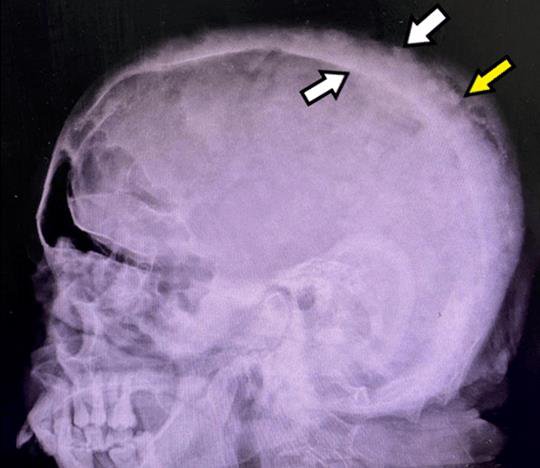-
Home
-
About JCTR
-
Gold Open Access
-
Issues
-
Editorial board
-
Author guidelines
-
Publication fees
-
Online first
-
Special issues
-
News
-
Publication ethics
-
Partners
-
Submit your manuscript
-
Submit your review report
-
Editorial Office
-

This work is licensed under a Creative Commons Attribution-NonCommercial 4.0 International License. ISSN print: 2382-6533 ISSN online: 2424-810X
Volume 9 Issue 4
A rare case of asymptomatic Paget’s disease of the skull in a 60-year-old Asian female
Muhammad Ali*, Omama Farooq, Zahra Rafique, Hajrah Farooq, Fazeelat Iftikhar, Muqadsa Malik
Ali et al. J Clin Transl Res 2023; 9(4):22-00186
Published online: July 26, 2023
Abstract
Background and aim: Paget’s disease of the bone (PDB) refers to a chronic cumulative disorder characterized by enhanced osteoclastic function followed by a secondary surge in osteoblastic activity. The condition can manifest as a polyostotic or monostotic bone disease with most patients having an asymptomatic presentation, although some may complain of pain localized to the affected bone while others express symptoms of nerve compression. A Pagetic bone is predisposed to develop pathological fractures, bony deformities, and a rare yet detrimental transformation into osteosarcoma. Detection is often accidental when performing radiographic tests for other indications or when elevated blood levels of alkaline phosphatase (ALP) are detected. Treatment with third-generation bisphosphonates is helpful in preventing further bone resorption and additionally, reduces bony pains that are believed to be caused by excessive metabolic activity. Here we present a case of a middle-aged asymptomatic female with elevated serum ALP levels up to 1537 IU/L (reference range 40-150 U/L) during her pre-operative evaluation for elective cholecystectomy. 99mTc-methylene diphosphonate (MDP) bone scintigraphy revealed diffuse uptake in the skull and hence was diagnosed as a case of isolated Paget’s disease of the skull.
Relevance for Patients: The rarity of this disease in Southeast-Asians, its uncontrived detection, and the isolated skull involvement, impart high clinical relevance on this case. Early detection and management of this disease can help prevent development of life-threatening complications in affected patients, hence decreasing the morbidity.

DOI: http://dx.doi.org/10.18053/jctres.09.202304.22-00186
Author affiliation
1. Internal medicine, Islamabad Medical Complex, Nescom Hospital, Islamabad
2. Internal medicine, Fauji Foundation Hospital, Rawalpindi
*Corresponding author
Muhammad Ali
Internal Medicine, Islamabad Medical Complex, Nescom Hospital, Islamabad.
Tel: +92 345 5240908
Email: muhammad.ali.janjua93@gmail.com
Handling editor:
Michal Heger
Department of Pharmaceutics, Utrecht University, the Netherlands
Department of Chemistry, Utrecht University, Utrecht, the Netherlands
Department of Pathology, Erasmus Medical Center, the Netherlands
Department of Pharmaceutics, Jiaxing University Medical College, Zhejiang, China

